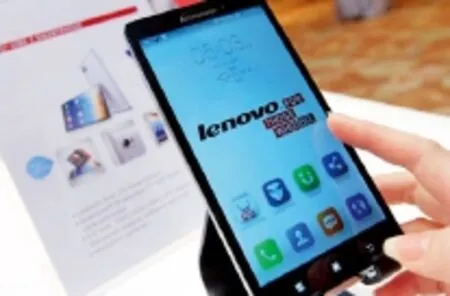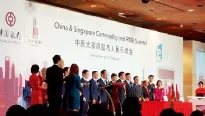COOPERATION
2016-09-26EditorLiuMengyu
Editor | Liu Mengyu
COOPERATION
Editor | Liu Mengyu

Indonesia
China-based computer giant Lenovo produces 4G smartphones in Indonesia China-based computer giant Lenovo has commenced local manufacture of its smartphones in Serang, Banten,Indonesia, aiming to cut the supply chain and illustrate the company's commitment to complying with the local content requirement.
The factory, a joint cooperation between local subsidiary PT Lenovo Indonesia and Serang-based electronics component manufacturer PT Tridharma Kencana (TDK), started its operations in Oct 2015, reporting a production capacity of 75,000 to 150,000 cell phones per month.
The factory produces Lenovo A6010 and A2010 series, with 20 percent local content.
Lenovo Indonesia smartphone division country head Adrie R Suhadi said that, according to the cooperation terms, TDK would provide workers and a plant site while Lenovo Indonesia would bring in experts, quality controllers and machines from China in order to enable the transfer of knowledge and technology to locals.
The announcement was attended by such members of government as Communications and Information Minister Rudiantara, Trade Minister Thomas Trikasih Lembong and Industry Minister Saleh Husin.
"We also want to deliver our products' latest technologies to the Indonesian customer faster," he said, expressing hope that a shorter supply chain allowed his products to reach the markets faster thus boosting brand growth. Currently,most Lenovo's gadgets are imported from China.
Having entered the Indonesian market in 2005, Lenovo has now topped the country's 4G smartphone market with a share of 19.2 percent and 27.4 percent in online sales, according to data from the International Data Corporation (IDC)Asia Pacific Quarterly Mobile Phone Tracker, in this year's second quarter.
Chen Xudong, MBG Group senior vice president of mobile business and Lenovo and Motorola mobility operating board, said that the strategic market led his firm to choose Indonesia to be among the first few countries outside China,besides Japan and Brazil, to produce Lenovo smartphones locally.

Laos
China, Laos sign railway deal China and Laos signed an intergovernmental railway cooperation agreement in Beijing on Nov 13, 2015, planning to introduce a modern rail line in Laos in 2020.
The two countries have agreed to use Chinese technology and equipment to build a 418-km line that will connect Kunming, capital of southwestern China's Yunnan province, with the Lao capital city of Vientiane, according to the agreement.
The line will start in Kunming and travel southward to Jinghong and Mohan until entering Laos through the Lao border city of Boten. It will then travel past Luang Prabang and Vang Vieng before arriving in Vientiane. It will transport passengers as well as cargo.
The railway's average speed is set at 160 kph and 60 percent of the line will be bridges and tunnels. China will be responsible for 70 percent of the 40billion Yuan ($6.27 billion) investment, while Laos will be responsible for the remainder.
Once it is operational, this line will become Laos' longest and fastest railway. Currently, the Southeast Asian nation has only one railway,which was opened in 2009 and links Vientiane with Thailand's Nong Khai.
"The project will significantly boost the socio-economic development of Laos, improve the nation's transportation and generate a lot of jobs for local people. Of course, it will also inject new momentum into the economy of China's southwestern regions," Wang Xiaotao, deputy head of National Development and Reform Commission, told reporters at the signing ceremony.
He did not disclose when the line's construction will begin, only saying that construction of the Chinese section between Yuxi and Mohan began in January.
The two nations began to discuss the cross-border line in 2010, but the project had not made any substantial development since then due to investment issues. The turning point took place in April 2014 when Lao Prime Minister Thongsing Thammavong visited China and talked with President Xi Jinping and Premier Li Keqiang on the railway. After that, railway authorities from both sides have speeded up their work.
Bilateral trade between China and Laos reached $3.6 billion last year,according to Somsavat Lengsavad.
Philippines
Philippines welcomes closer cooperation with China on infrastructure construction The Philippines has said it welcomes closer cooperation with China both at the government level and in private sector in the areas of transportation development and infrastructure construction.
In an exclusive interview with Xinhua, Joseph Emilio Abaya,secretary of the Philippine Department of Transportationand Communications, said that the Philippines can learn a lot from China when it comes to mass transit projects and traffic management.
Dalian Locomotive, a subsidiary of China Railway Rolling Stock Corporation Limited, will supply 48 light vehicles for the MRT-3 of Metro Manila, the country's capital, starting from early 2016.
The official said Dalian Locomotive went through a competitive bid for the MRT-3 deal,and the Philippine side saw the company's world-class facility and truly believes in Dalian's capability.
On Sino-Philippine cooperation in the field of infrastructure construction especially in transportation sector,the official said the cooperation should be carried out between both at the government level and in private sector.
Abaya said the department of transportation and communication welcomes more Chinese enterprises to come to the Philippines and work hand in hand with local companies.
"Filipino companies that partner with Chinese companies can bring in Chinese technology, financial capacity, and best practices," said Abaya, adding there are great potentials for cooperation between the two countries.
Singapore
Bank of China launches global commodity business centers in Singapore Bank of China (BOC) launched two global commodity business centers in Singapore, the bank announced at the China and Singapore Commodity and RMB Summit on Nov.6, 2015.
The global energy commodity business center and the global commodity repo center based in Singapore are set up as BOC eyes Singapore's location as the crossroads of Southeast Asia's major shipping routes, the bank said.
It said that Singapore is also the largest global fuel trade as well as the world's second largest agribusiness trade center and oil refining hub.
During the summit, BOC and International Enterprise Singapore(IE Singapore) also inked a Memorandum of Understanding(MoU) to collaborate on six key areas,said IE Singapore Chairman Seah Moon Ming in his opening speech.
Under the MoU, BOC will provide 50 billion Singapore dollars ($35.7 billion) of financial services to support enterprises from China and Singapore, which invest into countries along the Belt and Road region,while IE Singapore will facilitate the introduction of enterprises to BOC.
Other collaborations include setting up a new trade ecosystems in Singapore, and both parties will jointly promote RMB internationalization.
Singapore is the first regional financial center outside China to have a yuan clearing bank. And in 2014, it has surpassed London to become the second largest renminbi off-shore center in the world.

Thailand
‘ASEAN offers more advantages than the TPP‘Thailand should focus on trade and investment beyond Southeast Asia to cover the ASEAN+3 and ASEAN+6 groupings, says former ASEAN secretary-general Surin Pitsuwan.
Speaking at a seminar entitled "Thai Economy 2016: Opportunities and Challenges", Mr Surin said cooperation with China, South Korea,Japan, India, Australia and New Zealand would mean a bigger market with higher purchasing power than ASEAN 's population of 625 million.
It would open up more opportunities to export and invest in several industries to reach more consumers.
He believes ASEAN offers more advantages than the Trans-Pacific Partnership (TPP).
"Although the overall GDP of ASEAN members and its partners is lower than the GDP of those in the TPP agreement,Thailand should still focus on its regional trade cooperation rather than the TPP," Mr Surin said.

Vietnam
TCL brings new vision to Vietnam market Chinese electronics giant TCL has launched a new smart television in Vietnam, taking the traditional electronics industry in the Southeast Asian country to a new level.
The new model, the TCL Z1, has been introduced in cooperation with leading Vietnamese website Zing.
Users of the TCL Z1 in Vietnam can not only watch high definition TV programs, but also browse all information on the Zing.vn website. This includes a wide range of entertainment portals and provides access to news, music, social networking services, games, instant messaging and online payment.
An online shopping service is also available on the new TV for all TCL products in Vietnam.
Deng Yanan, general manager of TCL Vietnam, said: "This cooperation largely meets the demand of local clients and takes the industry to a new level."
TCL has the third-largest market share of the TV industry in Vietnam,Deng said, adding that this is due to efforts to build up and promote highquality brands at affordable prices.
"We localize our products and human resources as well as prioritizing corporate social responsibility in the country," he said.
The TCL Z1 is the latest product to appear under the company's localization strategy. In Ho Chi Minh City, more than 70 orders for the new model were placed each day in the launch week.
